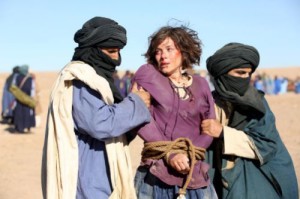The Idaho Stateman
AP by Paul Schemm
North African rebels, private mercenaries, greedy corporations and activists demonstrating against the 1 percent — the scenes from NBC’s new drama “American Odyssey” are torn straight from today’s headlines and address a growing national sense of paranoia that all is not right with the country.
NBC has created a complex show dealing with weighty issues with sets that stretch from New York to the deserts of North Africa. “American Odyssey,” which premieres Sunday (10 p.m. Eastern), will run for just 13 episodes.
The story follows three characters, a soldier, a lawyer and an activist, who separately stumble on a conspiracy with a vast, Halliburton-style American company run amok that appears to be funding al-Qaida-linked terrorists in northern Mali.
“You really wouldn’t see this on another network, it’s much more cable stuff,” said one of the creators, Peter Horton, known for producing and directing the TV series “Grey’s Anatomy” and being the laid-back guy on the 1980s drama “thirty something.”
Speaking during a break in shooting on a chilly night at the edge of the Moroccan desert that is standing in for Mali, he explained that the show looks at how much power the individual has to change things in the face of governments and wealthy companies.
“It asks the question, where is the power today?” he said. “It’s one we’re asking more and more these days because there is such a gap between rich and poor — government more and more is influenced by money.”
The story begins with Odelle Ballard, played by Anna Friel, the veteran British actress from “Pushing Daisies” and a host of stage and screen productions, who is part of a special forces unit that just seized the hideout of a top al-Qaida-linked militant in northern Mali.
Odelle, who works as a translator with the unit, stumbles upon computers suggesting links between the group and a U.S. corporation. Shortly afterward, her entire unit is wiped out by American mercenaries, likely for the information she has now secreted away on her person.
Odelle escapes, but is then captured by al-Qaida linked rebels and imprisoned. So begins her “odyssey” across North Africa to try to get back to her young daughter and bring to light the information she has found while being hunted by militants and mercenaries.
“There is no glamour to this part, let’s put it that way,” said Friel, sitting in the makeup trailer on the set. Her face is covered with the cuts and bruises she gets at every turn. “I’m tortured in some way in every episode — hit, pushed, jumping out windows.”
One of the hardest parts of the role has been the large amount of Arabic dialogue she had to learn for her character to speak with her captors and then later with the young Tuareg boy who helps her escape.
Anna, like her character, Odelle, has a young daughter waiting for her at home, though in her case it’s just a Skype call away.
Chasing her throughout the show is forbidding mercenary Frank Majors, a U.S. veteran who fought in Fallujah and now works for a private security company that is seeking to plug the leak Odelle has opened up — by any means necessary, including killing off her comrades.
Majors is played by the intimidating Adewale Akinnuoye-Agbaje, whose almost cockney London accent switches effortlessly into American for the part of the hard-bitten mercenary.
In the complex world of “Odyssey,” though, he’s quick to point out that his character — despite all he does — is not so much evil but a necessary part of the system.
“Without Frank Majors, there wouldn’t be an America, someone on the front line to do the dirty work allowing Americans to sleep quietly and have luxury, oil-filled cars,” he said, explaining the character was convinced he was a patriot.
The story jumps between sun-baked Mali and wintry New York City, where an anti-establishment activist (Jake Robinson) and a disillusioned lawyer (Peter Facinelli) start discovering different parts of the conspiracy.
Co-creator Horton is not worried the audience might be turned off by a show about current events that criticizes the system and sees this struggle of individuals to still make a difference in the face of powerful institutions as making it a very American story.
“I think what it focused on is pro-American in terms of what we hope America can be,” he said.
—
Online:








